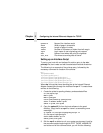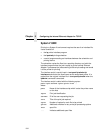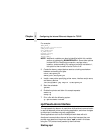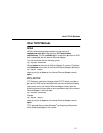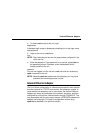
Chapter 5 Configuring the Internal Ethernet Adapter for TCP/IP
166
For example:
#END_MARK_1
NPDIR_PATH=./usr/local/bin
COMM_PROG=rcmdsh
UNIT_NAME=spike
LP_DEST=d1prn
PRINTER_TYPE=hp
BANNERPAGE=1
#START_MARK_1
NOTE: Additional variables can also be identified within this variable
section as indicated by BANNERPAGE=1. Some other options
include ASCII to PostScript conversion, carriage return
insertion, and scrambling. By setting a particular variable to 1,
this option is then turned on and a 0 turns it off.
3. Create the dummy output device used as a locking mechanism
between contending print jobs.
touch /dev/spike.prn
chmod go+rw /dev/spike.prn
4. Install a new printer specifying printer name, interface script name,
and dummy device.
/usr/lib/lpadmin -php -mnpr.if -v/dev/spike.prn
5. Start the scheduler
lpsched
6. Enable the printer and allow it to accept requests.
enable hp
accept hp
7. Print a file with the following syntax:
lp -d
printername filename
npd Pseudo-device Interface
The npd pseudo-tty daemon is used when bi-directional communication
is required between printer and printing application, and when changes
to the printer’s interface script are undesirable.
Some applications such as Sun NeWSprint work best with a bi-
directional communication channel to the printer because they can
provide more details on the printer status. npd is used in this case
using the TCP protocol and pseudo-tty device drivers.
Starting npd







